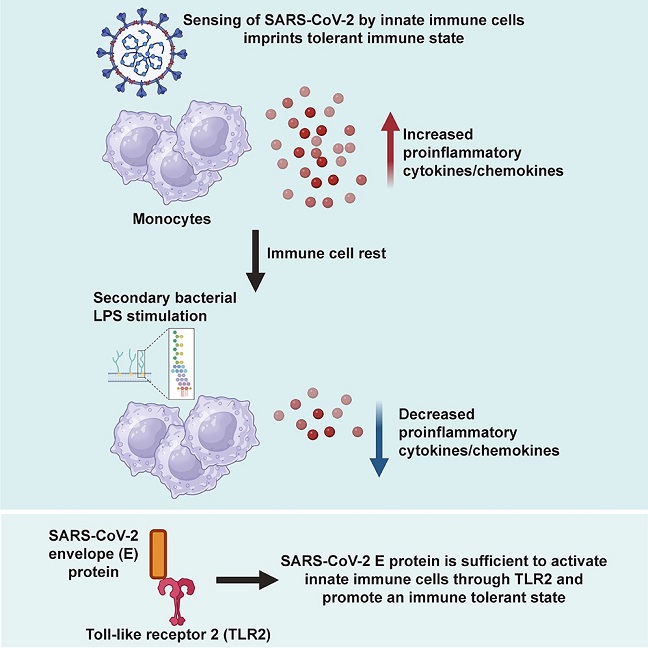Nikhil Prasad Fact checked by:Thailand Medical News Team May 20, 2024 10 months, 3 weeks, 3 days, 11 hours, 37 minutes ago
COVID-19 News: Researchers from Children’s Mercy Research Institute, University of Kansas Medical Center, and University of Missouri have made a groundbreaking discovery about the SARS-CoV-2 virus, which causes COVID-19. Their study that is covered in this
COVID-19 News report, reveals that the envelope (E) protein of the virus plays a critical role in regulating the immune system's response, leading to long-term immune dysfunction. This discovery also helps explain why severe COVID-19 cases often result in prolonged hospital stays and increased vulnerability to secondary infections.
 Graphical Abstract - SARS-CoV-2 E Protein Induces Long-Term Immune Dysfunction
The Role of the E Protein in Immune Activation
Graphical Abstract - SARS-CoV-2 E Protein Induces Long-Term Immune Dysfunction
The Role of the E Protein in Immune Activation
The SARS-CoV-2 virus comprises three main structural proteins: the spike (S) glycoprotein, the envelope (E) protein, and the nucleocapsid (N) protein. While much of the focus has been on the spike protein, which facilitates the virus's entry into host cells, the E protein has now been identified as a key player in the immune response. The study found that the E protein activates innate immune cells through Toll-like receptor 2 (TLR2) signaling, which triggers an inflammatory response.
Immune Tolerance and Long-Term Dysfunction
Interestingly, the E protein not only initiates an immune response but also induces a state of immune tolerance. After the initial activation, monocytes (a type of immune cell) enter a tolerant state where their responsiveness to subsequent stimuli is significantly reduced. This tolerance was observed in both human cells and mouse models. For instance, mice exposed to the E protein showed reduced lung inflammation when later challenged with lipopolysaccharide (LPS), a component of bacterial cell walls that typically triggers a strong immune response.
Detailed Findings and Implications
The study provided several key insights:
-Activation of Innate Immune Cells: The E protein stimulates the production of proinflammatory cytokines (signaling molecules) in human monocytes. This was evidenced by a significant increase in cytokines such as IL-6, TNF-α, and others compared to the S and N proteins.
-Induction of Immune Tolerance: Following initial stimulation with the E protein, monocytes displayed a markedly reduced response to secondary stimuli, such as LPS or the E protein itself. This suggests that the E protein imprints a long-lasting tolerant state on these immune cells.
-Dose-Dependent Effects: The degree of immune tolerance was found to be dose-dependent. Higher doses of the E protein led to more pronounced immune tolerance, whereas lower doses showed a different immune modulation, potentially indicating a shift towards a more trained immune response.
Transcriptome Changes in Monocytes
To further understand the mechanisms behind this i
mmune tolerance, the researchers performed RNA sequencing on monocytes. They discovered significant changes in gene expression, particularly in genes regulated by NF-κB and Myc, both of which are known to play roles in immune cell activation and tolerance. These findings highlight the complex interplay between viral proteins and the host immune system, revealing potential targets for therapeutic intervention.
In Vivo Evidence from Mouse Models
The study also utilized neonatal mouse models to investigate the effects of E protein exposure on lung inflammation. Mice treated with the E protein showed significantly reduced expression of pro-inflammatory cytokines in the lungs after a subsequent LPS challenge. This in vivo evidence supports the idea that prior exposure to the E protein can attenuate the immune response to secondary infections, potentially leading to less severe inflammatory responses in the lungs.
Therapeutic Implications and Future Research
The discovery that the SARS-CoV-2 E protein can induce a long-term state of immune tolerance opens up new avenues for therapeutic strategies. Targeting the E protein could help mitigate the severe inflammatory responses seen in COVID-19 and prevent the establishment of immune tolerance that increases susceptibility to secondary infections.
Potential for Broader Applications
Given the high sequence conservation of the E protein among various SARS-CoV-2 variants and related coronaviruses, therapies targeting the E protein could have broad applications. This could be particularly valuable in managing not only COVID-19 but also future coronavirus outbreaks.
Conclusion
The study finding provides critical insights into the immune dysregulation caused by SARS-CoV-2. By identifying the E protein's role in inducing immune tolerance, the research highlights potential therapeutic targets to restore immune function and reduce the risk of severe disease outcomes. This discovery is a significant step forward in understanding the complexities of COVID-19 and developing effective treatments to combat its long-term effects.
The study findings were published in the peer reviewed journal: iScience.
https://www.sciencedirect.com/science/article/pii/S2589004224011970
For the latest
COVID-19 News, keep on logging to Thailand Medical News.
Read Also:
https://www.thailandmedical.news/news/sars-cov-2-envelope-protein-down-regulates-tight-junctional-proteins-compromising-the-integrity-of-the-airway-epithelial-barrier#google_vignette
https://www.thailandmedical.news/news/scientists-discover-an-amyloidogenic-fragment-in-sars-cov-2-envelope-protein-that-promotes-serum-amyloid-a-misfolding-and-fibrillization
https://www.thailandmedical.news/news/covid-19-news-french-study-finds-that-sars-cov-2-envelop-protein-has-a-carboxy-terminal-that-contains-a-pdz-binding-motif-that-is-pathogenetic
https://www.thailandmedical.news/news/covid-19-news-sars-cov-2-e-protein-induces-inflammatory-response-and-monocyte-pyroptosis-which-can-be-reversed-by-ruscogenin
https://www.thailandmedical.news/news/university-of-kansas-study-shockingly-reveals-that-the-envelope-protein-of-sars-cov-2-potently-inhibits-hiv-1-infection
https://www.thailandmedical.news/news/french-study-uncovers-that-a-short-sequence-in-the-tail-of-sars-cov-2-envelope-protein-controls-accessibility-of-its-pdz-binding-motif-to-the-cytoplas
https://www.thailandmedical.news/news/researchers-warn-that-sars-cov-2-envelope-protein-mutations-affects-pathogenicity-of-omicron-xbb-sub-lineages
https://www.thailandmedical.news/news/university-of-oklahoma-study-discovers-how-the-polypeptide-sk9-from-the-envelope-protein-of-sars-cov-2-causes-parkinson-s-disease
https://www.thailandmedical.news/news/breaking-french-study-shows-that-sars-cov-2-envelope-protein-e-binds-and-activates-tlr2-and-causes-production-of-cxcl8-inflammatory-chemokine
